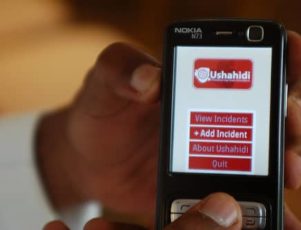The mobile crowdsourcing platform, launched by Kenyan entrepreneurs nearly a decade ago, has been used by an estimated 90,000 projects worldwide.
Ushahidi, the mobile crowdsourcing software used to alert people of danger during civil unrest and to help aid agencies provide relief in disaster zones, is taking the world one text at a time.
Used in 159 countries and 31 languages, the software was developed and first deployed during post-election violence in Kenya nearly a decade ago. Today, Ushahidi estimates 90,000 projects worldwide have used the software, which is available as a free download.
Ushahidi, which means “witness” in Swahili, has grown from an ad hoc team trying to save lives in a crisis into a sophisticated nonprofit software development organization that aims to help solve global problems.
Its widely used open source crowdsourcing tool enables people to share information and interactive maps on their phones using SMS text messaging.
Platform documented violence
Four Kenyan technologists developed the software in 2007. As protests over disputed elections spiraled into violence at the end of that year, an estimated 1,500 people were killed in two months. In Nairobi, unwittingly walking into a neighborhood where violence had erupted could mean injury or death.
Enter the Ushahidi crowdsourcing software, which enabled residents to report flare-ups. The software mapped these reports to show people what areas they should avoid in real time, potentially saving hundreds of lives.
The initial deployment drew 45,000 users in Kenya who documented hundreds of incidents of violence that might have otherwise not been reported.
It was developed in a few days by an ad hoc group of technologists and bloggers “trying to figure out a way to gather more and better information about the post-election violence,’’ according to co-founder Ory Okolloh, who said the group believed the government and police were underreporting the number of deaths.

Helped aid workers after Haiti earthquake
The platform gained international prominence in the aftermath of the 2010 earthquake in Haiti, when it was used to identify and map locations where rescue and aid were needed. Within days, a live Ushahidi map had 2,000 individual reports that were mapped using satellite imagery. The platform was credited by aid workers with saving hundreds of lives.
Use of the platform has grown exponentially and has adapted to different situations.
While it is impossible to know how many people are using the platform because it is a free download, Ushahidi estimates it has been deployed for 90,000 projects with 6.5 million posts that have potentially reached 20 million people.
Deployed in media crackdowns, war zones
In Nigeria, Mozambique, Zambia, Colombia and Albania, groups used the participatory platform to detect election fraud. It is being used in Sweden to collect reports of anti-gay discrimination. It was also used during media crackdowns in Egypt during and after the Arab Spring. Organizations including the United Nations Office of Humanitarian Affairs have used it to coordinate aid activities in Libya, Syria and Afghanistan.
In Nigeria’s election-monitoring, one report found that use of the Ushahidi software increased voter turnout by 8% in 2011.
In a 2015 election in Nigeria, social media was a force in keeping the polling process transparent but the Ushahidi data-collection platform offered more credible information, according to Liesl Louw-Vaudran, a consultant with the Institute for Security Studies.
“Lively activity on social media also has a downside, however, with rumors of violence, cheating and slandering of opponents being rife on Twitter,” Louw-Vaudran said. “This is almost impossible to control, but data-gathering software like Ushahidi, can serve to provide early warning of potential election violence.”
Global software developer
With philanthropic support, Ushahidi has grown into one of Africa’s major software developers. Headquartered in Nairobi, it has global operations. Backers include the Omidyar Network, the Ford Foundation, the Knight Foundation, the MacArthur Foundation, Humanity United, Google and Cisco.
While the crowdsourcing software is a free download, organizations pay Ushahidi for support and customization, as well as other software products it has developed including data collection, management, visualization tools and enterprise systems.
Another Ushahidi project includes partnership in the Resilient Network Initiative, which trains community organizations to use open-source tools to engage with their local governments.

